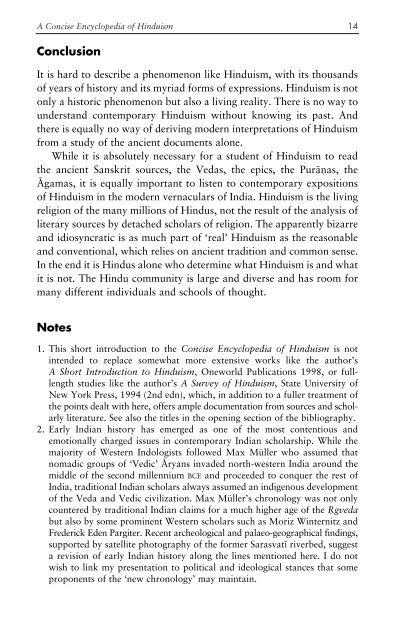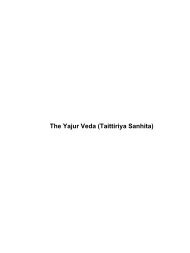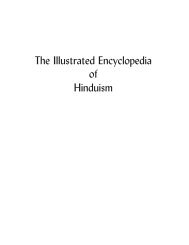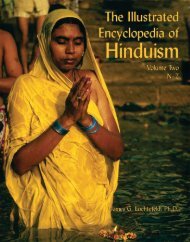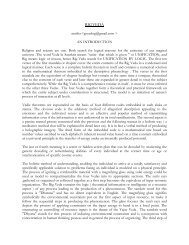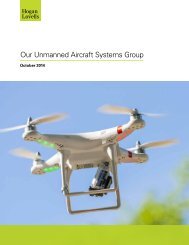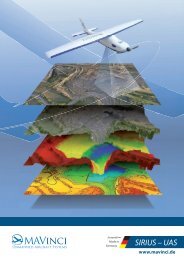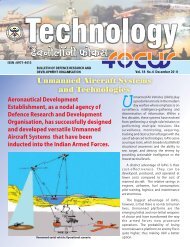A Concise Encyclopedia of Hinduism Klaus K Klostermaie
Create successful ePaper yourself
Turn your PDF publications into a flip-book with our unique Google optimized e-Paper software.
A <strong>Concise</strong> <strong>Encyclopedia</strong> <strong>of</strong> <strong>Hinduism</strong> 14<br />
Conclusion<br />
It is hard to describe a phenomenon like <strong>Hinduism</strong>, with its thousands<br />
<strong>of</strong> years <strong>of</strong> history and its myriad forms <strong>of</strong> expressions. <strong>Hinduism</strong> is not<br />
only a historic phenomenon but also a living reality. There is no way to<br />
understand contemporary <strong>Hinduism</strong> without knowing its past. And<br />
there is equally no way <strong>of</strong> deriving modern interpretations <strong>of</strong> <strong>Hinduism</strong><br />
from a study <strong>of</strong> the ancient documents alone.<br />
While it is absolutely necessary for a student <strong>of</strong> <strong>Hinduism</strong> to read<br />
the ancient Sanskrit sources, the Vedas, the epics, the Puräæas, the<br />
Ägamas, it is equally important to listen to contemporary expositions<br />
<strong>of</strong> <strong>Hinduism</strong> in the modern vernaculars <strong>of</strong> India. <strong>Hinduism</strong> is the living<br />
religion <strong>of</strong> the many millions <strong>of</strong> Hindus, not the result <strong>of</strong> the analysis <strong>of</strong><br />
literary sources by detached scholars <strong>of</strong> religion. The apparently bizarre<br />
and idiosyncratic is as much part <strong>of</strong> ‘real’ <strong>Hinduism</strong> as the reasonable<br />
and conventional, which relies on ancient tradition and common sense.<br />
In the end it is Hindus alone who determine what <strong>Hinduism</strong> is and what<br />
it is not. The Hindu community is large and diverse and has room for<br />
many different individuals and schools <strong>of</strong> thought.<br />
Notes<br />
1. This short introduction to the <strong>Concise</strong> <strong>Encyclopedia</strong> <strong>of</strong> <strong>Hinduism</strong> is not<br />
intended to replace somewhat more extensive works like the author’s<br />
A Short Introduction to <strong>Hinduism</strong>, Oneworld Publications 1998, or fulllength<br />
studies like the author’s A Survey <strong>of</strong> <strong>Hinduism</strong>, State University <strong>of</strong><br />
New York Press, 1994 (2nd edn), which, in addition to a fuller treatment <strong>of</strong><br />
the points dealt with here, <strong>of</strong>fers ample documentation from sources and scholarly<br />
literature. See also the titles in the opening section <strong>of</strong> the bibliography.<br />
2. Early Indian history has emerged as one <strong>of</strong> the most contentious and<br />
emotionally charged issues in contemporary Indian scholarship. While the<br />
majority <strong>of</strong> Western Indologists followed Max Müller who assumed that<br />
nomadic groups <strong>of</strong> ‘Vedic’ Äryans invaded north-western India around the<br />
middle <strong>of</strong> the second millennium BCE and proceeded to conquer the rest <strong>of</strong><br />
India, traditional Indian scholars always assumed an indigenous development<br />
<strong>of</strong> the Veda and Vedic civilization. Max Müller’s chronology was not only<br />
countered by traditional Indian claims for a much higher age <strong>of</strong> the Øgveda<br />
but also by some prominent Western scholars such as Moriz Winternitz and<br />
Frederick Eden Pargiter. Recent archeological and palaeo-geographical findings,<br />
supported by satellite photography <strong>of</strong> the former Sarasvatï riverbed, suggest<br />
a revision <strong>of</strong> early Indian history along the lines mentioned here. I do not<br />
wish to link my presentation to political and ideological stances that some<br />
proponents <strong>of</strong> the ‘new chronology’ may maintain.


